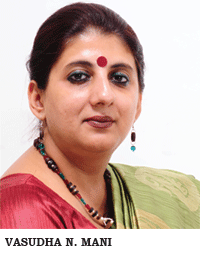By education I mean an all-round drawing out of the best in child and man — body, mind and spirit — Mahatma Gandhi
 Once upon a time, the Indian subcontinent was the global epicentre of education. The world’s first university established at Takshashila in 700 BC offered close to 70 subjects including languages, grammar, philosophy, medicine, surgery, sports, politics, sciences, etc.
Once upon a time, the Indian subcontinent was the global epicentre of education. The world’s first university established at Takshashila in 700 BC offered close to 70 subjects including languages, grammar, philosophy, medicine, surgery, sports, politics, sciences, etc.
Two millennia later, although it’s fashionable to refer to India as an emerging global education hub, ground realities in Indian education — particularly K-12 education — are far removed from such wishful thinking. In 2009 after much vacillation, the Union government nominated a batch of 16,000 students from government and private schools in Himachal Pradesh and Tamil Nadu — widely acknowledged as India’s most educationally advanced states — to write PISA (Programme for International Student Assessment), a global annual test which assesses the English, science and maths skills of 15-year-olds. After the scores of the 74 national teams which wrote the exam were tabulated, India was ranked #73, just a notch higher than Kyrgyzstan.
Likewise, a 2011 study conducted by the Ahmedabad-based Educational Initiatives indicated that even among top-ranked English-medium schools in five metros, students exhibited large knowledge gaps and regressive gender prejudices. Moreover, the Annual Status of Education Report 2012, published by the Mumbai-based NGO Pratham, shows that learning outcomes in rural primary schools are steadily declining with 53 percent of children in class V unable to read simple sentences (in their mother tongue) which they should have learned in class II, and 47 percent unable to do two-digit subtraction sums.
If academic education in contemporary India is in the doldrums, values education is no better. The media is replete with stories of corruption, gender violence, child neglect and abuse. This is an indictment of the teachers’ community and of the entire education system.
Therefore academics and teachers need to introspect and think afresh about the type of education we need to deliver to the world’s largest child population. A wholesome and complete education system must develop the mind, body, and soul (values, morality) of all students. But teachers and educators need a road map to attain these objectives. Unfortunately in the current education system, the focus is not on holistic development, but on high grades in board examinations. Other aspects of healthy development — sports and spiritual education — are being increasingly neglected.
Perhaps the only pedagogy innovation in school education in recent times has been the Continuous and Comprehensive Evaluation (CCE) system which is being implemented with questionable success in 14,000 CBSE-affiliated schools across the country. However as detailed by Education-World (August), the preparatory groundwork for implementing CCE effectively has been inadequate. For one, the system imposes a great load on teachers, especially in classes where the teacher-pupil ratio is above 1:30. There is insufficient appreciation that if classroom size exceeds 40, the system collapses. Moreover, grades inflation has become rampant under CCE with students routinely being graded A+ (91-100 percent). Consequently liberal marking by teachers has widened the quality gap between teaching-learning standards in secondary and higher secondary education.
It’s against this background of declining teaching-learning standards in India, that the need to revive the tradition of providing complete or holistic education to students in K-12 (and higher) education assumes significance. The teachers’ community needs to understand that the education process has to extend beyond classrooms and textbooks. It requires greater interaction between students and teachers, and also students and elders with the latter sharing their life skills and experiences. The best education this writer received was while sharing long walks with her father, when values and virtues and the need to work for the betterment of less fortunate citizens were discussed, debated and explored.
The urgent need for moral and values-based education — and the high price the nation is paying for neglecting spiritual education — was highlighted during the rain and floods disaster in Uttarakhand in June. Neither the state government, nor local communities or people’s organisations were able to manage or cope with the crisis. Worse, instead of uniting to save and provide relief, hotel managers raised tariffs with tea/water/chapati being sold at blackmarket prices. Humanity and charity were abandoned even as greed and cruelty were practiced openly. As a teacher and educationist, I believe my community is to blame for the complete breakdown of ethics, and compassion for the poor and distressed.
An ancient Chinese proverb offers centuries-old advice to India’s establishment. “If you are planning for a year, sow rice; if you are planning for a decade, plant trees; if you are planning for a lifetime, educate people,’’ it urges.
Above all, teachers need to know and always bear in mind that education extends far beyond academics.
Also Read: Eduleader Focus: Dr. Vasudha Neel Mani, Rockwoods International School
(Vasudha Neel Mani is the principal of Rockwoods International School, Udaipur)























